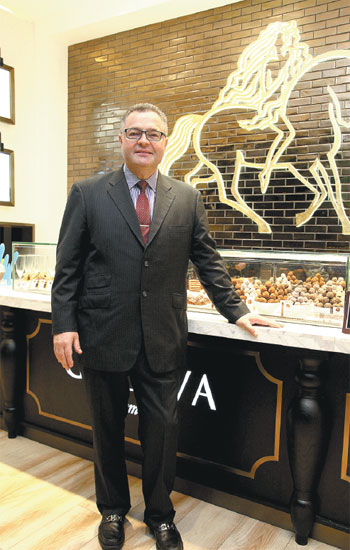Cooking up success with a sweet touch
Updated: 2015-07-27 14:13
By Zhu Wenqian(China Daily USA)
|
|||||||||
Boss' interpersonal approach helps Godiva carve an industry niche Andy Farrow has donned many hats before he took over as the managing director of Godiva China and Pacific Rim in October last year.
With over three decades of retailing experience behind him in sectors like DIY, fashion, cosmetics, electronics and food, Farrow was until recently heading the China operations of US tech giant Apple Inc.
Farrow says it was his love for cooking that led him to Godiva, the Belgian chocolatier known for its gold packaging and high-end products. Working with the company is all about enriching other people's lives, he said.
"It was fun working with Apple. But I am also enjoying what I am doing in Godiva. There are lots of similarities between the two companies. Like Apple, we are also at the forefront of innovation and looking to build strong emotional connections with consumers through our products," he said.
Unlike most of his peers, Farrow takes a rather different approach to work. Humor, he says, is the glue that holds the team together. "We sit together, laugh and joke around. There are no barriers here. Lightening the mood helps push the envelope and encourages the team to try something different. The one thing that I keep telling my team is not to be afraid of making mistakes," said Farrow.
"I don't have a physical office; I sit with the rest of the team on a normal desk. I go to a small meeting room if I need to make a private phone call. I have done this for the past 15 years. It is lonely to be a boss and if you sit in a private office it would feel even lonelier," he said.
"Managers are always talking about having an open-door policy. I don't believe you should even have a door or wall. Instead, you should be with your team and get to know them well. I personally know everyone in my Shanghai team and my style is more about being honest and collaborative."
According to Farrow, China and the rest of Asia offer huge growth potential for chocolate companies. But the road ahead is also about grabbing the opportunities, he said in an exclusive interview. Excerpts:
What prompted you to make the Godiva outlet in Xintiandi, Shanghai your global flagship store?
Our optimism about China stems from the growing demand from Chinese consumers for quality products. It is obvious that they want the best things. We see China as a huge market with so many opportunities.
Godiva has 15 stores in Shanghai. Xintiandi is a place where the eastern culture meets western culture, and it's a major tourism area. It is not only a great store for the local community, but also for Chinese and international tourists. We are planning to open many more stores in Shanghai.
What are your competitive advantages vis-��-vis other luxury chocolatiers?
We are a boutique brand that has strong emotional connections with consumers. Most of the other brands just sell their products in supermarkets. That is a core difference.
Could you tell us a little about how Godiva is planning to spread its reach in China?
We will continue to open many more stores and expand into many more areas in China. Currently, we have 55 stores in China, and we hope to have at least 100 stores very soon, and then beyond that.
We have stores in 16 cities in China, including Beijing, Shanghai, Guangzhou and Shenzhen. We are also in Qingdao, Wuhan, Chongqing, Chengdu and Ningbo. We are in the east coast, and also in the inland regions.
We also plan to expand to some of the key third-tier cities, and there are some areas in western China that we are looking at. We are still in negotiations.
Do you have any e-commerce expansion plans?
We have e-commerce on our own official website. We are on Tmall.com and we just launched on JD.com. We are also looking at other platforms. China is a vast country and we cannot open a boutique in every city. We have already reached over 300 cities with our e-commerce plan. We want to continue doing so. The growth of e-commerce in China is a lesson to the whole world on how it should be done. I expect the sector to grow exponentially over the next five to 10 years.
What is the main difference between China and the Western markets?
If you look at the product range, everything is pretty consistent globally. If you look at Asia all the way through, people here prefer chocolate that is less sweet, while Americans tend to like it very, very sweet. But our core products in China are the same as what is being sold in the United States. We do not want to alter the taste, as customers are actually getting a taste of Belgium and its rich heritage. I think some brands failed in China when they tried to adjust the products too much.
Have you developed some specific chocolate products for the China market?
Absolutely. We are always doing special collections. We celebrate a number of holidays like Easter and Christmas in the West. China also has a number of different holidays. We developed chocolate moon cake for the Mid-Autumn Festival and I can tell you it is very delicious.
We also celebrate Chinese Valentine's Day and Chinese New Year with special packaging and different types of chocolates. The chefs understand the local markets.
Chocolate consumption in China is still very low compared to the Western market, or even compared to South Korea and Japan. How do you see it growing in China?
An average Chinese consumer consumes just 0.4 kilogram of chocolate a year, which is small compared to the US and other places. But that also tells me about the huge potential.
We have been in Japan since 1977 and in China for just five years. As people's taste buds change, I think that will continue to grow from a low base. It is growing for us exponentially. I am very happy that the consumption is kind of low now as there will be more opportunities.
Many people are afraid of getting fat and sick by eating too much chocolate. What are your comments?
According to available market research, chocolate with high cocoa content, like 85 percent of cocoa, is actually very good for health. It has antioxidants that help your body. So eating high-quality chocolate does not make you fat. In fact, one of our main strategies in China is to educate consumers about the health benefits of chocolate.
Who are your major consumer groups in China?
We have the normal type of gifting consumers, who have been very loyal to our brand. The biggest tourist group in the world currently are actually Chinese, and a lot of tourists buy our products when they travel to Europe, the US and Japan.
I don't think our main consumers are middle and upper class, as we want to cover all age groups. Since we launched our self-created products, like the chocolate ice-cream, we have younger-generation customers coming through. Our stores that are close to student areas are doing exceptionally well.
You used to be the general manager of Apple Inc in China. Why did you change over to the chocolate sector?
I will tell you what I tell my children. I have a 27-year-old son down to a four-year-old daughter. I have told them that in life, you have to do something that you feel passionate about. I really want to build the emotional connection between products and consumers and decided to join the brand that I was always fond of. Every time I go home, my daughter asks me: "Have you got something for me?"
Do you think you are a romantic person?
Gosh... I think I am. I don't know whether my wife would say I am romantic. I think it's important to have romance in your life, and luckily I work for a company that is all about romance, especially when you give chocolates.
What are your hobbies?
I love to cook, I like doing dumplings and xiaolongbao. I like cooking Italian and French food as well, but I am nowhere near professional. I like to keep fit and enjoy playing with my daughter. I know more about Barbie princesses than I ever wanted to.
I go to the gym every single day, especially when I am getting older, I try to keep fit. My wife is a Taiwanese and my parents-in-law live with me, so I love to cook during the weekends. And I love to draw and paint. When I retire, I plan to go to an art school. And I love Formula One.
How do you break the ice with Chinese businessmen?
I always talk about family. I think in any business deal that I have ever done in China, it is about relationships. Western businessmen tend to talk about business straightway. Here I try to find something that is of shared interest.
It is important to find something that is common to both and then develop on that. I am surprised about the number of Chinese businessmen who like soccer. I can hold myself on soccer, cars and other things. But family is something that is the key.
zhuwenqian@chinadaily.com.cn
|
Andy Farrow, managing director of Godiva China and Pacific Rim. Provided To China Daily |
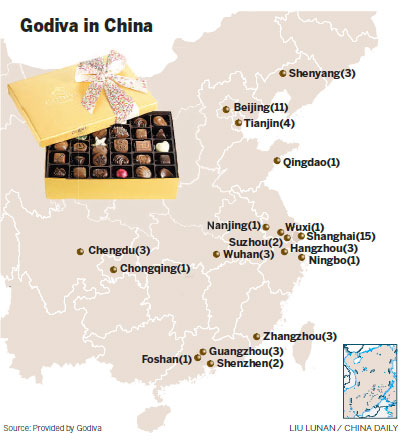
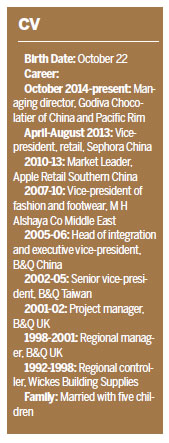
(China Daily USA 07/27/2015 page15)
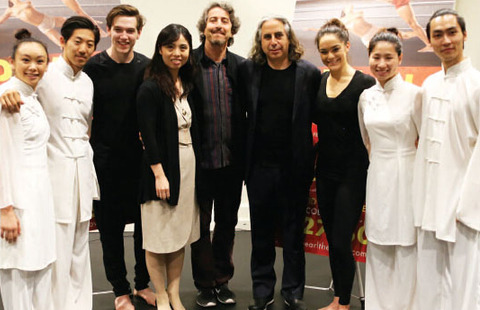
 Across America over the week (July 17- July 23)
Across America over the week (July 17- July 23)
 Unusual but true: 'Love' conquers all
Unusual but true: 'Love' conquers all
 Six dead as rainstorms wreak havoc in China
Six dead as rainstorms wreak havoc in China
 Guangzhou Evergrande stun Bayern in penalty shootout
Guangzhou Evergrande stun Bayern in penalty shootout
 10 domestic films to see this summer
10 domestic films to see this summer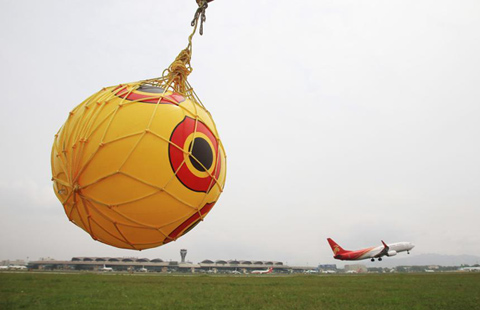
 Tricks airports use to scare away birds
Tricks airports use to scare away birds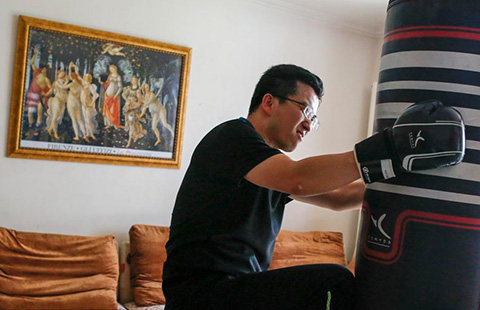
 The highs and lows of a stock market investor
The highs and lows of a stock market investor
 Culture insider: 7 things you may not know about Major Heat
Culture insider: 7 things you may not know about Major Heat
Most Viewed
Editor's Picks

|

|

|

|

|

|
Today's Top News
Astronomers discover most Earth-like planet yet
Seattle Chinatown leader killed in shooting
Flight details of Obama's Kenya trip leaked
2 killed, several injured in Louisiana theater shooting
Deficit hits $104b in first half
Obama to meet extended family members in Kenya
More Chinese companies become world top 500
Earth-like planet discovered using NASA's Kepler space telescope
US Weekly

|

|
